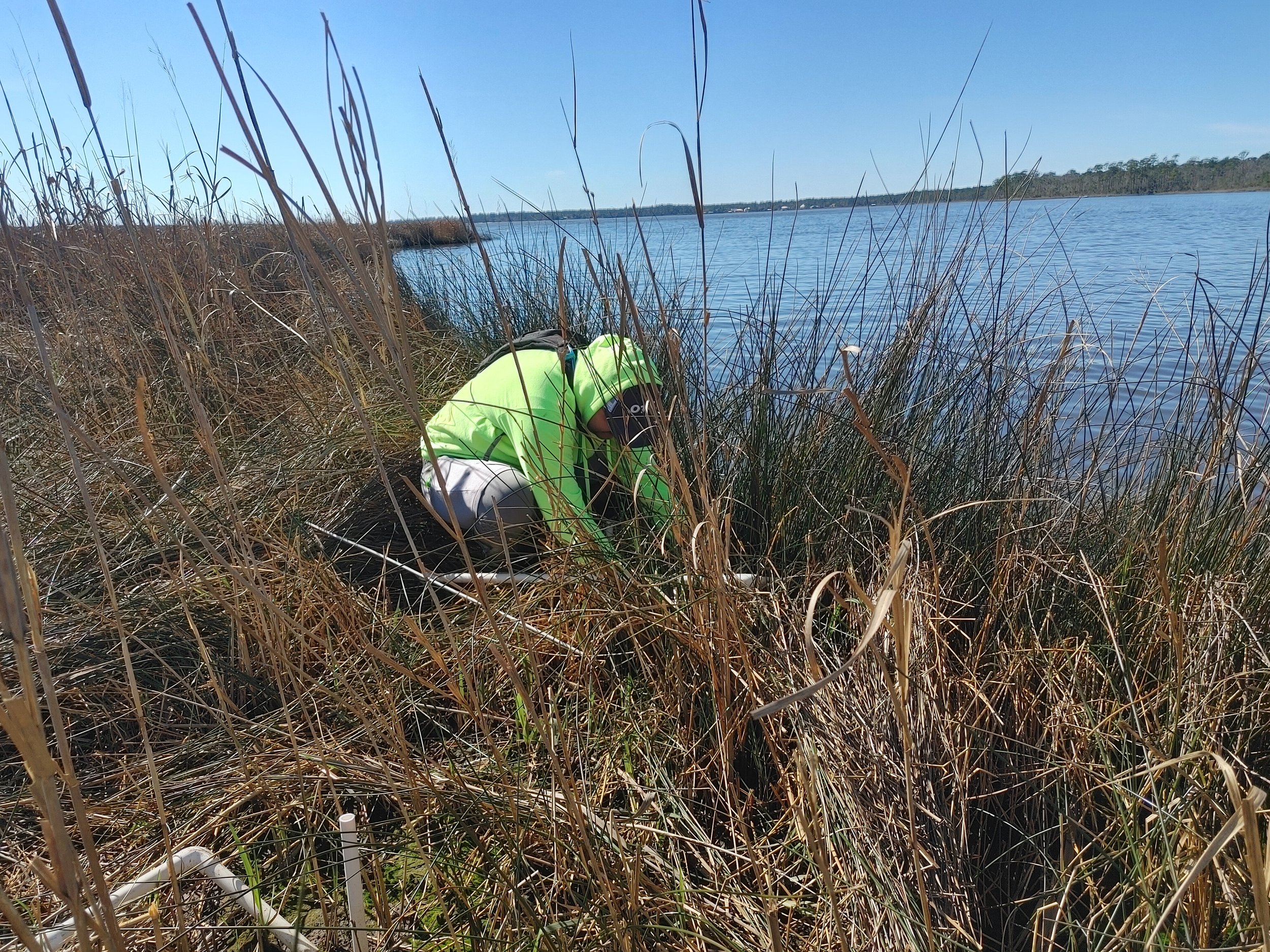
Join the Bio-Funk Lab!
We are currently looking for PhD/MS students, a full-time research technician,
and undergraduate researchers. Scroll down for details on each position.
PhD/MS Students
I am seeking 1-2 graduate students to start in Fall 2024. I am open to students with a range of interests and backgrounds. Areas of research interest include: trophic ecology, facilitation, ecosystem engineers, restoration, wetland ecology, desert ecology, coastal ecology, carbon & nitrogen cycling, animal-microbe interactions, functional trait ecology, anthropogenic stressors, range-expansion, invasive species, succession, phenotypic plasticity, stoichiometry, and environmental ethics. Graduate students can develop field, laboratory, modelling, or synthesis- based projects. Students can work across a variety of ecosystems, including (but not limited to) our current sites in Israel, Mississippi, Alabama, Pennsylvania, and New Jersey.
Students will be considered for either a teaching fellowship or research fellowship. Students with research fellowships (unless these are independent awards like the NSF GRFP, see below) will split their time working on lab projects and personal thesis projects. Fellows have a starting 9-month salary (paid over 12 months) of $27,000 (+ benefits). Tuition costs for PhDs can be covered for at least one year. Potential MS students please contact me to discuss tuition. Graduate students in my research program enroll in Drexel University’s PhD or MS degree in Ecology, Evolution, and Earth Systems.
Drexel University’s Graduate College will cover up to the full cost of the Drexel Student Health Insurance Plan offered through Aetna Student Health to all Teaching Assistants, Research Assistants, Graduate Assistants, and National Research Service Pre-Doctoral Fellows enrolled and working on a full-time basis. For more on graduate student health insurance (and other information like scholarships, public transportation benefits, and travel awards visit Drexel University’s Graduate College.
If you are interested in joining my lab as a Graduate Student, please contact me at sarinehart@ua.edu or srinehart@ucdavis.edu (I am officially starting at Drexel in September 2023). When you contact me, please include 1) a brief statement (2-5 sentences) on why you are interested in joining my research group and what you would be interested in working on, 2) a brief statement (~1-3 sentences) of your research experience, 3) a CV with up to date information on your educational and research experience, and 4) the contact (email and phone) information for 2-3 professional references. I will read your information and reach out to set up a zoom meeting. Following the zoom meeting I may reach out to your professional references. Finalists may be invited for a site visit (November - January 2023).
The Drexel University deadline for US MS applicants is Sept. 1st 2024; international MS applicants is May 15th 2024; and PhD applicants is (priority) Jan 15th 2024.
It is required that you contact me prior to applying. The formal application requires official transcripts, a resume/CV, an Essay (500 words on why you want to attend Drexel— submitted through the Discover Drexel Portal), and two letters of recommendation (electronically-requested or submitted by mail). A full description of the application process and requirements for the Ecology, Evolution and Earth Systems PhD and MS programs can be found here and here. Competitive applicants will be encouraged to apply to Drexel University’s Graduate College Doctoral Fellowship (Blue & Gold), the National Science Foundation’s Graduate Research Fellowship (GRFP), the National Estuarine Research Reserve’s Margaret A. Davidson Graduate Fellowship, or other relevant funding opportunities. I can work with you to develop these applications and find other opportunities.
Research Technician
I am looking for a research technician to help coordinate field experiments and laboratory processing. Experiments will look broadly at the impacts of animals (e.g., snails, burrowing crabs, blue crabs) on tidal marsh and dryland ecosystem functions. Field sampling will require coring sediments, extracting sediment porewater, quantifying sediment gas fluxes, measuring plant community traits, and estimating crab and other invertebrate densities and community composition. Laboratory processing will include tasks like grinding sediments, ashing sediments, preparing samples for elemental analysis (carbon and nitrogen), sorting and weighing above- and belowground plant biomass, running nutrient (e.g., nitrate, ammonium) samples, measuring gas fluxes, measuring biogeochemical properties, and image analysis. There may also be opportunities to work on laboratory based experiments that will involve growing biofilm/biocrust communities and maintaining populations of various invertebrates. Technicians will also work on data entry and will have opportunities to strengthen their data analysis skills.
Technicians will also have the opportunity to take the lead on projects and develop side projects that build on lab interests. Technicians leading independent projects will be encouraged to publish and will be supported through the publication process. Technicians will also be considered for authorship on papers resulting from collaborative lab projects that they assist on. There will also be opportunities to gain mentorship experience with undergraduate students.
The Technician can work full-time or part-time. Some remote work will be possible, but the Technician would need to be in the laboratory (or field) at Drexel University or The Academy of Natural Sciences at least four days (full-time) a week. More remote work will be possible after field season (picks up April - October). Hours will be somewhat flexible, but long field days, overnight field trips, and weekend field trips will be required ~ 2-3 times per month. There may also be opportunities to participate in longer (~2-4 weeks) international field trips to Israel, Sweden, etc.
I am open to folks with diverse educational and research experiences in areas such as population biology, community ecology, ecosystem ecology, behavioral ecology, environmental science, soil science, marine biology, wetland ecology, plant biology, oceanography, entomology, and other similar fields. You should have at least a bachelor's degree in a relevant field and 1-2 years of independent research experience (including as an undergraduate researcher for pay or credit).
The starting salary is $15-20 per hour including benefits (full-time). This is a 18 month position with the potential for extension pending funding. To find out more about your health coverage as Drexel University staff here. Other staff benefit information can be found here.
If you are interested in joining my lab as a Research Technician, please contact me at sarinehart@ua.edu or srinehart@ucdavis.edu (I am officially starting at Drexel in September 2023). When you contact me, please include 1) a brief statement (~1-3 sentences) of why you are interested in joining my research group, 2) a brief statement (~1-3 sentences) of your research experience, 3) a CV with up to date information on your educational and research experience, and 4) the contact information for 2-3 professional references. I will read your information and reach out to set up a zoom meeting. Following the zoom meeting I may reach out to your professional references.
Undergraduate Research Assistants
I am looking for undergraduate researchers to assist graduate students, research technicians, and myself with field experiments and laboratory processing. Undergraduate researchers can volunteer, receive credit, or be paid (e.g., Co-op positions). Research will look broadly at the impacts of animals (e.g., snails, burrowing crabs, blue crabs) on tidal marsh and dryland ecosystem functions. Field sampling will include coring sediments, extracting sediment porewater, quantifying sediment gas fluxes, measuring plant community traits, and estimating crab and other invertebrate densities and community composition. Laboratory processing will include tasks like grinding sediments, ashing sediments, preparing samples for elemental analysis (carbon and nitrogen), sorting and weighing above- and belowground plant biomass, running nutrient (e.g., nitrate, ammonium) samples, measuring gas fluxes, measuring biogeochemical properties, and image analysis. There may also be opportunities to help grow biofilm/biocrust communities and maintain populations of various invertebrates. Undergraduate researchers may also be asked to help with data entry and may have opportunities to learn some data analysis skills. There is no prior experience needed with any of these skills, simply a willingness to learn!
Undergraduate researchers that assist for at least one year will have the opportunity to take the lead on projects and develop side projects that build on lab interests. Undergraduate researchers leading independent projects will be encouraged to publish and will be supported through the publication process. Undergraduate researchers will also be considered for authorship on papers resulting from collaborative lab projects that they assist on. There may also be opportunities to gain skills applying to research funding, such as through the Society of Wetland Scientists, Pennoni Honors College, and STAR (Students Tackling Advanced Research) Scholars Program.
Undergraduate researchers will primarily assist in the laboratory at Drexel University (PISB) and The Academy of Natural Sciences. Hours will be determined at the start of each quarter. There may be opportunities to participate in field days, overnight field trips, and weekend field trips. There may also be opportunities to participate in longer (~2-4 weeks) international field trips to Israel, Sweden, etc.
If you are interested in joining my lab as an Undergraduate Researcher, please contact me at sarinehart@ua.edu or srinehart@ucdavis.edu (I am officially starting at Drexel in September 2023). When you contact me, please include a brief statement (~1-3 sentences) of why you are interested in joining my research group and a resume/CV with up to date information on your educational and work experience. I will read your information and reach out to set up a meeting.











